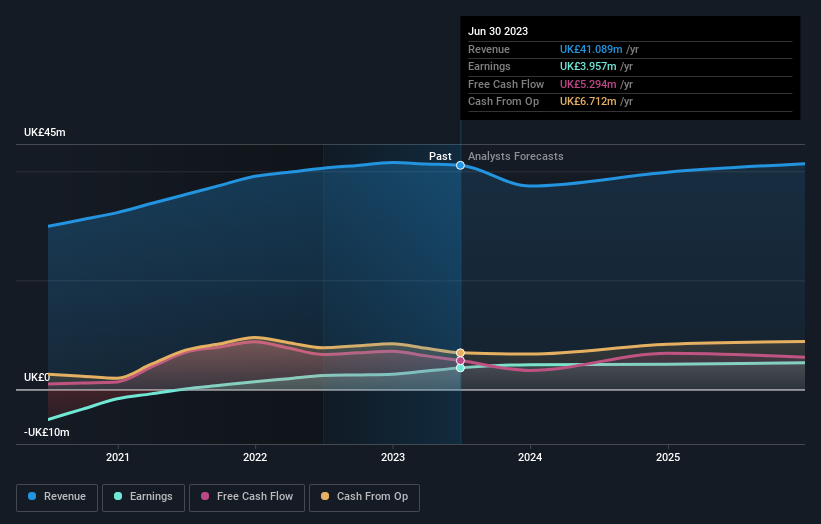Centaur Media (LON:CAU) investors are sitting on a loss of 19% if they invested a year ago
It's easy to match the overall market return by buying an index fund. But if you buy individual stocks, you can do both better or worse than that. Investors in Centaur Media Plc (LON:CAU) have tasted that bitter downside in the last year, as the share price dropped 24%. That falls noticeably short of the market decline of around 4.1%. Longer term investors have fared much better, since the share price is up 16% in three years. On the other hand, we note it's up 8.1% in about a month.
So let's have a look and see if the longer term performance of the company has been in line with the underlying business' progress.
View our latest analysis for Centaur Media
To paraphrase Benjamin Graham: Over the short term the market is a voting machine, but over the long term it's a weighing machine. One imperfect but simple way to consider how the market perception of a company has shifted is to compare the change in the earnings per share (EPS) with the share price movement.
During the unfortunate twelve months during which the Centaur Media share price fell, it actually saw its earnings per share (EPS) improve by 57%. It could be that the share price was previously over-hyped.
It's surprising to see the share price fall so much, despite the improved EPS. But we might find some different metrics explain the share price movements better.
Revenue was fairly steady year on year, which isn't usually such a bad thing. But the share price might be lower because the market expected a meaningful improvement, and got none.
You can see how earnings and revenue have changed over time in the image below (click on the chart to see the exact values).
We know that Centaur Media has improved its bottom line over the last three years, but what does the future have in store? This free interactive report on Centaur Media's balance sheet strength is a great place to start, if you want to investigate the stock further.
What About Dividends?
It is important to consider the total shareholder return, as well as the share price return, for any given stock. Whereas the share price return only reflects the change in the share price, the TSR includes the value of dividends (assuming they were reinvested) and the benefit of any discounted capital raising or spin-off. So for companies that pay a generous dividend, the TSR is often a lot higher than the share price return. As it happens, Centaur Media's TSR for the last 1 year was -19%, which exceeds the share price return mentioned earlier. And there's no prize for guessing that the dividend payments largely explain the divergence!
A Different Perspective
Investors in Centaur Media had a tough year, with a total loss of 19% (including dividends), against a market gain of about 4.1%. Even the share prices of good stocks drop sometimes, but we want to see improvements in the fundamental metrics of a business, before getting too interested. On the bright side, long term shareholders have made money, with a gain of 0.8% per year over half a decade. If the fundamental data continues to indicate long term sustainable growth, the current sell-off could be an opportunity worth considering. It's always interesting to track share price performance over the longer term. But to understand Centaur Media better, we need to consider many other factors. Case in point: We've spotted 2 warning signs for Centaur Media you should be aware of.
For those who like to find winning investments this free list of growing companies with recent insider purchasing, could be just the ticket.
Please note, the market returns quoted in this article reflect the market weighted average returns of stocks that currently trade on British exchanges.
Have feedback on this article? Concerned about the content? Get in touch with us directly. Alternatively, email editorial-team (at) simplywallst.com.
This article by Simply Wall St is general in nature. We provide commentary based on historical data and analyst forecasts only using an unbiased methodology and our articles are not intended to be financial advice. It does not constitute a recommendation to buy or sell any stock, and does not take account of your objectives, or your financial situation. We aim to bring you long-term focused analysis driven by fundamental data. Note that our analysis may not factor in the latest price-sensitive company announcements or qualitative material. Simply Wall St has no position in any stocks mentioned.

